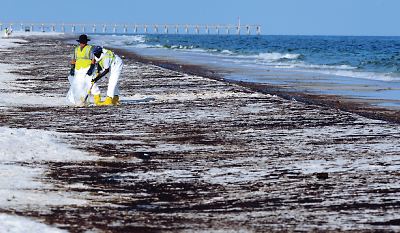MH Care Benefits From Oil Spill Settlement
Abstract
Universities in four states will expand mental health work-force capacity and provide services to people affected by the 2010 BP oil spill in the Gulf of Mexico, sharing a $36 million chunk of the $7.8 billion overall spill settlement.

People directly affected by the aftermath of the 2010 BP oil spill in the Gulf of Mexico have higher rates of mental health symptoms than unexposed populations. A special fund created as part of the $7.8 billion legal settlement will go to provide therapeutic and supportive mental health services in the region.
The funds will go to the Mental and Behavioral Health Capacity Project, created by the settlement decree to provide therapeutic and supportive services in federally qualified health centers, other primary care clinics, and school-based programs in affected coastal communities.
Under a formula based on needs and disparities, the Louisiana State University Health Sciences Center (LSUHSC) will get $14.4 million. Another $8.2 million each will go to the University of Southern Mississippi and the University of South Alabama. The University of West Florida will manage $5.8 million of the funds.
The amounts will be distributed over five years and must be formally certified in a final court decree in November, Howard Osofsky, M.D., Ph.D., a professor and chair of psychiatry at LSUHSC, told Psychiatric News.
LSUHSC researchers have conducted school-based surveys in the region since the aftermath of Hurricane Katrina in 2005 and community mental health needs assessments since the Gulf Oil Spill in 2010.
“Both in 2010 and 2011, we found significant elevations in mental health symptoms in people directly affected by the spill, compared with those in the same areas not exposed,” said Osofsky.
Local resources have been strained since many mental health professionals left the Gulf Coast area after Hurricane Katrina and did not return.
At the University of Southern Mississippi (USM), the five-year grant will support 125 M.S.W. students and psychology trainees working in primary care settings and human service agencies.
“The money will be used to increase access for community residents by adding training for people working in existing mental health programs and by training new ones,” said Timothy Rehner, Ph.D., a professor of social work in the USM School of Social Work in Hattiesburg and director of its Caribbean Studies Program.
“We’ll start this summer by hiring a director for the program, then a trauma-focused faculty instructor, and then begin recruiting students,” said Rehner in an interview. “We can have the first group of 20 students by spring.”
The University of West Florida (UWF) in Pensacola will train primary care clinicians, helping them make the doctor’s office a place to encourage discussion of mental health issues and set up follow-up appointments, said Glenn E. Rohrer, Ph.D., L.C.S.W., a professor at UWF and director of its School of Justice Studies and Social Work.
“We want to get psychiatrists, psychologists, and social workers in as part of the training process and get the next generation thinking about integrated care,” said Rohrer.
The project will move carefully to determine how communities can best benefit from the funds, said Osofsky. Initial efforts will be directed at discussions with local clinic personnel, schools, community providers, and others.
The project team will spend time learning what people in coastal communities believe they need or don’t need, said Osofsky.
“How can we cooperate with them and with professionals from other mental health disciplines?” he said. “We’re not there to tell them what to do.”
Depending on those local needs, psychiatrists or advanced residents and other mental health professionals could make clinic visits to provide direct services, serve as consultants to primary care clinicians, offer telepsychiatry services, or provide training for schools and communities.
“We plan to have direct 24-hour availability for primary care physicians to speak to a psychiatrist,” said Osofsky.
In the long run, the project also hopes to increase the capacity of mental health care and primary care in the region and demonstrate how states, communities, and university-based clinicians can work collaboratively to improve mental health outcomes, he said.
“However, the process has to be sustainable,” said Rohrer. “What can we do to prepare for the next disaster? And that is a matter of when, not if.” 
The settlement document covering the Mental and Behavioral Health Capacity Project of the Gulf Region Health Out-reach Program is posted at www.deepwaterhorizonsettlements.com/Documents/Medical%20SA/Ex14_Grant_Proposal_Mental_and_Behavioral_Health_Capacity_Project.pdf.



